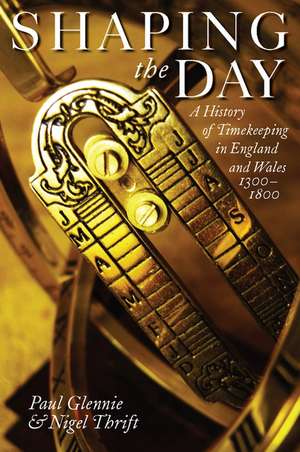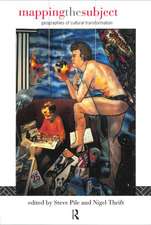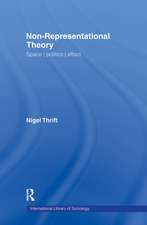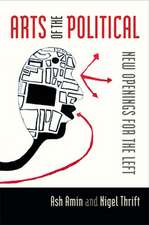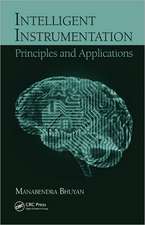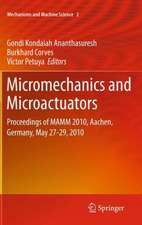Shaping the Day: A History of Timekeeping in England and Wales 1300-1800
Autor Paul Glennie, Nigel Thriften Limba Engleză Hardback – 12 feb 2009
| Toate formatele și edițiile | Preț | Express |
|---|---|---|
| Paperback (1) | 346.62 lei 31-38 zile | |
| OUP OXFORD – 10 feb 2011 | 346.62 lei 31-38 zile | |
| Hardback (1) | 606.19 lei 31-38 zile | |
| OUP OXFORD – 12 feb 2009 | 606.19 lei 31-38 zile |
Preț: 606.19 lei
Preț vechi: 863.13 lei
-30% Nou
Puncte Express: 909
Preț estimativ în valută:
115.100€ • 124.04$ • 96.71£
115.100€ • 124.04$ • 96.71£
Carte tipărită la comandă
Livrare economică 07-14 aprilie
Preluare comenzi: 021 569.72.76
Specificații
ISBN-13: 9780199278206
ISBN-10: 0199278202
Pagini: 480
Ilustrații: 8pp plates, 53 in-text illustrations
Dimensiuni: 163 x 240 x 28 mm
Greutate: 0.95 kg
Editura: OUP OXFORD
Colecția OUP Oxford
Locul publicării:Oxford, United Kingdom
ISBN-10: 0199278202
Pagini: 480
Ilustrații: 8pp plates, 53 in-text illustrations
Dimensiuni: 163 x 240 x 28 mm
Greutate: 0.95 kg
Editura: OUP OXFORD
Colecția OUP Oxford
Locul publicării:Oxford, United Kingdom
Recenzii
There is a great deal of interest in this book, and many thought-provoking questions posed ... a provocative new look at timekeeping.
[The authors'] approach is sophisticated and refreshing.
[A] scrupulously researched...[and] impressive volume
A rigorously researched, ambitiously conceived, and richly detailed study of the practice of timekeeping - its origins, dynamics, and impact - set in a broad social and cultural context...a stunning achievement, with major implications for our understanding of technological innovation and the role of timekeeping in early modern Britain.
The book is full of thought-provoking evidence that will prove useful to historians and historical geographers pursuing a wide range of social and cultural enquiries...accessible and engagingly written.
An obligatory read for historical geographers...historians, anthropologists, sociologists, and students of the humanities. We can summarize: stimulating and provocative? Indubitably, yes. Informative? Massively, both theoretically and in the empirical chapters. Timely? Not before time, not a moment too soon, on time...essential.
This meaty and informative study fruitfully revises the existing history of timekeeping
The great achievement of Glennie and Thrift's work is that it provides us with a much richer and fuller history of timekeeping in England and Wales from the late medieval period to the advent of 'modernity' than has hithero existed.
[The authors'] approach is sophisticated and refreshing.
[A] scrupulously researched...[and] impressive volume
A rigorously researched, ambitiously conceived, and richly detailed study of the practice of timekeeping - its origins, dynamics, and impact - set in a broad social and cultural context...a stunning achievement, with major implications for our understanding of technological innovation and the role of timekeeping in early modern Britain.
The book is full of thought-provoking evidence that will prove useful to historians and historical geographers pursuing a wide range of social and cultural enquiries...accessible and engagingly written.
An obligatory read for historical geographers...historians, anthropologists, sociologists, and students of the humanities. We can summarize: stimulating and provocative? Indubitably, yes. Informative? Massively, both theoretically and in the empirical chapters. Timely? Not before time, not a moment too soon, on time...essential.
This meaty and informative study fruitfully revises the existing history of timekeeping
The great achievement of Glennie and Thrift's work is that it provides us with a much richer and fuller history of timekeeping in England and Wales from the late medieval period to the advent of 'modernity' than has hithero existed.
Notă biografică
Dr Paul Glennie is Senior Lecturer in Geography at the University of BristolProfessor Nigel Thrift is currently Vice-Chancellor of the University of Warwick, an Emeritus Professor of the University of Bristol and a Visiting Professor at the University of Oxford. One of the world's leading human geographers and social scientists, Professor Thrift has, during his academic career, been the recipient of a number of distinguished academic awards, including the Royal Geographical Society Victoria Medal for contributions to geographic research in 2003 and Distinguished Scholarship Honors from the Association of American Geographers in 2007. He is an Academician of the Academy of Learned Societies for the Social Sciences, was made a Fellow of the British Academy in 2003, was in the top five of the most-cited geographers in the world from 1988 to 2002, and is co-author, author or co-editor of over 35 books.
